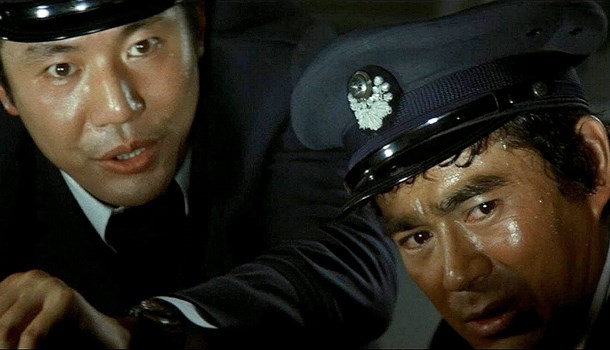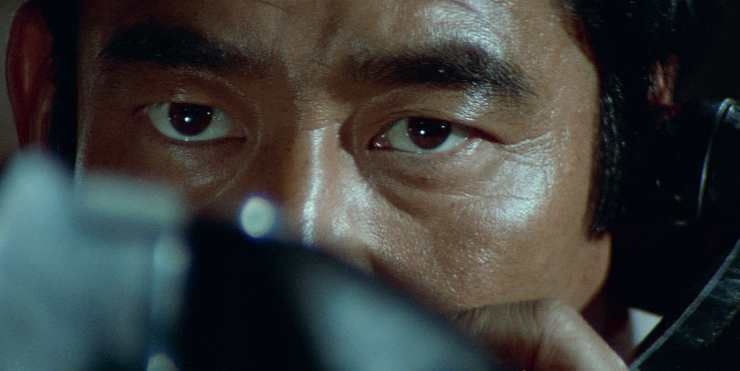
Written by Richard Durrance on 28 Apr 2023
Distributor Eureka • Certificate PG • Price £18.99
With the recent release of The Executioner box set and The Street Fighter trilogy, The Bullet Train added to the sudden flurry of Sonny Chiba films being available in HD. However, this is not your normal Sonny Chiba bone-crunching action film at all.
What should be a standard bullet train trip from Tokyo to Hakata is made perilous as failed businessman, Okita (Ken Takakura) and his friends have placed a bomb on the train that will go off once the train goes under 80km/ph... So, it’s up to the police to find those responsible, and for train driver Aoki (Sonny Chiba) to keep the train hurtling along, with the aid of Kuramochi (Ken Ustui), the master administrator of all the bullet trains on the track.
In fact, those watching the film for maximum Chiba might be dismayed as for the most part he’s almost entirely absent from the film. True he’s billed second to the film’s star, Ken Takakura and of course the film never sells itself as a martial arts action film, but rather a sweaty and tense thriller.
It’s an intriguing film though when you consider it in context, because of how many Japanese films of the time were either moving towards the pink end of the spectrum or else brutal yakuza pictures. Yet Bullet Train is an out-and-out thriller - no sex, action only when required and a focus on tension and character. But it also has some interesting overtones, with hints of the American disaster movies of the time, especially in those scenes within the train, as the passengers begin to understand what is happening to them as stations they should stop at flow by, panic ensuing and added moments of contrived drama; the pregnant woman giving birth and the businessman who absolutely must stop the train for his billion yen international deal of the century. Rather than feeling like they are dealing with genuine emotion it’s a melodramatic disaster picture trope-fest and you suspect these scenes were added with an eye on selling to the American market (there is an international release version dubbed into English, which is also included on the disc), especially considering star Ken Takakura would have been familiar to American audiences from his work in Sydney Pollack’s 1974 drama The Yakuza alongside the great Robert Mitchum. These train scenes arguably are absolutely the worst part of the picture and could easily have been dispensed with as much of it goes nowhere, but thankfully despite the film’s 150-minute running time most of the story really focuses on Okita, the police investigation, and the administrators of the bullet train to ensure the tracks are clear, not to mention investigating where the bomb could be.
The film is far more compelling and assured when in this mode and is also surprising for how much it both focuses on and is sympathetic to Takakura’s Okita. True, Ken Takakura has always had such gravitas that you only need look at his still face to see emotions sweeping under the surface, but the film intentionally tracks back to look at why he and his co-conspirators have found themselves blackmailing the government and putting people’s lives at risk. Okita is no mad bomber (though there’s an extra with Kim Newman talking about mad bombers), he’s thoughtful and wants no one to be hurt and so in a strange way the film introduces a sense of tragedy as harm comes to Okita’s conspirators. It’s unexpected and goes a long way to making the film as effective as it is, as though much of the mechanisms of the blackmail, the delivery of the money, the police investigation, the sweaty manipulations of track and train that ensures Chiba’s Aoki can keep the train running are shot and paced so that they are always compelling. In this, the extra depth of characterisation is vital. Why? In part because this would otherwise be more of a procedural film. With a cast of so many officers and officials it's hard, even over two-and-a-half hours, to give them much depth. Rather than run purely on adrenaline and tension, it allows itself to stop and understand what might drive people to such desperate ends.

Just looking into those eyes you can feel the emotions under the surface pop out
The same is true of Oshiro and Koga, who are Okita’s partner in crime. These are not arch-criminals or masterminds but normal people who have found themselves in difficult times and made a wrong choice, albeit without malice. This relationship really sustains much of the emotional impact when moments of gunplay action hit, and these are not pyrotechnic moments but instead remain focussed on the impact of what that action might have on the passengers on the train, though it’s the emotional impact on Okita, Oshiro and Koga that really matters. Strangely, for such a film if anything these are the guys that you really root for because they are not bad people and have the most clearly honest emotions – unlike most of the train passengers who are selfishly demanding that their rights are put above those of others.
Then, on the other side of justice, is train-wrangling Kuramochi, who is also given more depth than is perhaps perhaps warranted, but it’s understandable in the context of the story because he is most often responsible for awful, dangerous decisions in keeping the bullet train running. He runs risks but it’s always underscored by how his character is clearly an expert, understanding the systems and running of the railway to allow him to make crucial calls, yet at the same time, sat with three stopwatches going there's a sense of analogue dread: the margins are so fine they need to concurrently clock up the seconds of each variable that could lead to disaster.
Though the film has a certain notoriety for being an inspiration for the Keanu Reeves/Sandra Bullock vehicle, Speed, as I say you often see little of what happens on the train. Chiba does get to do some (non-martial arts) heroics towards the end, it's these moments on the train where it’s high-risk that are the most effective, unlike those where it deals with the passengers. Honestly at one point I was wishing Chiba would suddenly rip off his uniform and karate the shit out of some of the worst, most selfish travellers. Even though Chiba has little to do he handles Aoki as best he can and his scenes over a telephone with Kuramochi are appropriately tense.
Considering the age of the film, the effects (mostly) stand up pretty well, even if at times you can tell certain exterior bullet train scenes are all hobby-toy-trains, but it never breaks your suspension of disbelief with those expected moments of trains being manipulated to race either past or alongside one another are really well handled by director Junya Sato, who ratchets up the tension beautifully. At moments there are hints of The Taking of Pelham 123 in the tension and you wonder if that film from the year before in some ways influenced Bullet Train's sweatier moments, as well as Kuramochi’s role, which has some similarities to Walter Matthau’s transit policeman in that film.
Overall, I had a great time with The Bullet Train. True, the moments on the train, especially the superfluous baby delivery onboard and generally loathsome passengers are a distraction but thankfully they are rarely seen, instead the remorseless focus on the character of our well-meaning villains and the tense action sequences are what really make the film such a solid proposition. It makes great use of the usual "deliver the money here" scenes, introducing just the right level of invention mixed with sympathy and action. At the heart of it is Ken Takakura’s seriously imposing, emotionally deep performance as Okita. When you see him engage with people in his character’s life they all live and breathe in a way that is perhaps unexpected from what could otherwise be a pretty straight down the line thriller.

Long-time anime dilettante and general lover of cinema. Obsessive re-watcher of 'stuff'. Has issues with dubs. Will go off on tangents about other things that no one else cares about but is sadly passionate about. (Also, parentheses come as standard.) Looks curiously like Jo Shishido, hamster cheeks and all.
posted by Richard Durrance on 12 Feb 2026
posted by Richard Durrance on 10 Feb 2026
posted by Richard Durrance on 07 Feb 2026
posted by Richard Durrance on 03 Feb 2026
posted by Richard Durrance on 27 Jan 2026
posted by Richard Durrance on 19 Jan 2026
posted by Richard Durrance on 08 Jan 2026
posted by Richard Durrance on 17 Dec 2025